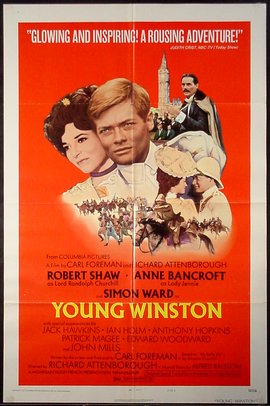
YOUNG WINSTON
UK, 1972, 157 Minutes, Colour.
Robert Shaw, Ann Bancroft, Simon Ward, Jack Hawkins, Ian Holm, Patrick Magee, Anthony Hopkins, Edward Woodward, Colin Blakely, John Mills.
Directed by Richard Attenborough.
Young Winston has an old world-new world fascination that keeps it audience interested despite a cumbersome framework of flashbacks. What involves us are the excellent performances of Simon Ward, Robert Shaw and Anne Bancroft, the feeling for detail of the production that makes us feel we have lived for some time in the late Victorian world, and the incredible self-centredness, ambition and drive of Winston himself as he melodramatically strives to succeed - and the Battle of Britain is still forty years off when the film ends. Admirers of Churchill will probably find the film absorbing. Younger audiences who enjoy history will respond similarly.
1. The appeal of this film? What audience was it made for? What interest? British response? Overseas response? Interest in Winston Churchill, his early years, his later years and impact in 20th century history? How satisfactory a tribute was this film?
2. How wise was the screenplay to restrict the scope to his early life? The epic look of Churchill's early life, 19th century adventure, the atmosphere of Empire,, Empire politics, building up a career, a basis for his 20th century activity? Was the film satisfying in its limited scope?
3. The importance of Panavision. colour, Indian African locations? The importance of the themes of England and Churchill? The importance of a star-filled cast? Appropriate casting, the distraction of having so many stars? The star cast as a tribute to Churchill?
4. How satisfying was the structure? The opening in India and its build-up and the revelation of these as flashbacks? The importance of flashbacks to Churchill's earlier life? The technique of having interviews with Churchill,, his mother and his father? The structure based on the autobiography and the importance of Churchill's commentary? The success of Simon Ward in capturing Churchill's voice and intonation? At varying stages of his life? The portrayal of a success story?
5. The important sequences of Churchill as a child? What did they communicate about him? Especially in view of the scenes already seen of his young manhood? The boy as a loner. stately home. the harsh school and its severity of teachers,, headmaster? His exams and failures? The distance between his parents and himself? His looking out at them from a distance? His attachment to his nurse. as signified in the scene of her death? His going to Sandhurst? His attitude towards his parents and theirs' towards him? Did the family background explain Churchill's ambitions?
6. The portrayal of Land Randolph? Robert Shaw's style? What kind of man was he in himself? As a noble, parliamentarian? His gruff manner, brusque relationships with his wife? A man wanting success? Disappointment in his son? Not brooking failure? The importance of the few intimate scenes of himself with Winston? especially about Winston's ambitions to be a soldier? His attitudes of severity,, punishment? His illness? His behaviour seen in the light of his illness? The fact that he was dying of syphilis and the 19th century doctors' reticence in this matter? The response of Jenny Churchill? What was revealed about Lord Randolph in his interview with the unseen interview with the unseen interviewer? Was this a rounded portrayal of this man?
7. The characterisation of Jenny Churchill? As an attractive woman? As a mother? Her love for Winston., yet her distance., place in society? American background? Her support of Lord Randolph,, her ambitions and her ambitions for Winston? Her advice when he returned from South Africa? Her threatening him and yet her supporting him? Distance and closeness with her son? Her effect on him? How much of herself did she reveal in the interview?
8. The Indian sequences: the atmosphere for the opening, British Empire and danger, the siege, sudden death, violence? Churchill and his role as a correspondent, his impetuous heroism? Its effect on people? An explanation on his ability to rally loyalty?
9. The ambitious young man and his book, the effect on Kitchener? How credible was Kitchener's response? How satirically presented?
10. The change of atmosphere to the Sudan? Kitchener's role here? Churchill's impetuosity and brashness? His exhilaration in participating in the charge? The visualising of the charge?
11. The portrayal of British society in the 19th century? The world of politics? The various politicians; Lord Salisbury and his associates? Success and failure in politics? The portrayal of the leisurely way of life in garden parties, social events?
12. The contrast with South Africa at the turn of the century? Churchill's involvement, his being caught, association with Haldane, the plans for his escape, the ordinary people giving him help, the miners? The exhilaration of his escape? His autobiographical comments and his exhilaration as the train passed the border?
13. The transition to Parliament and his wanting election? His success? His meeting the people of Oldham and the miner's wife? A visual presentation of Churchill and his seeking popularity?
14. How wise was he in daring and risking his parliamentary career in his speech? His mother's pleading, Lloyd George's attitude?
15. A fitting climax to the film? The speech in itself, the response of politicians, especially George and Chamberlain? Lloyd George? His mother's pride? The beginning of his career?
16. How well did the film lay the foundations for his future, his final comments, the marriage to Clementine Rozier?
17. The strength of the minor characters and the stars who portrayed the-m? At school, in English society, the army? Buccold and the portrayal of the newspaper response to Churchill?
18. How important a 20th century figure was Winston Churchill? How adequately did this film introduce us to his life and its meaning?